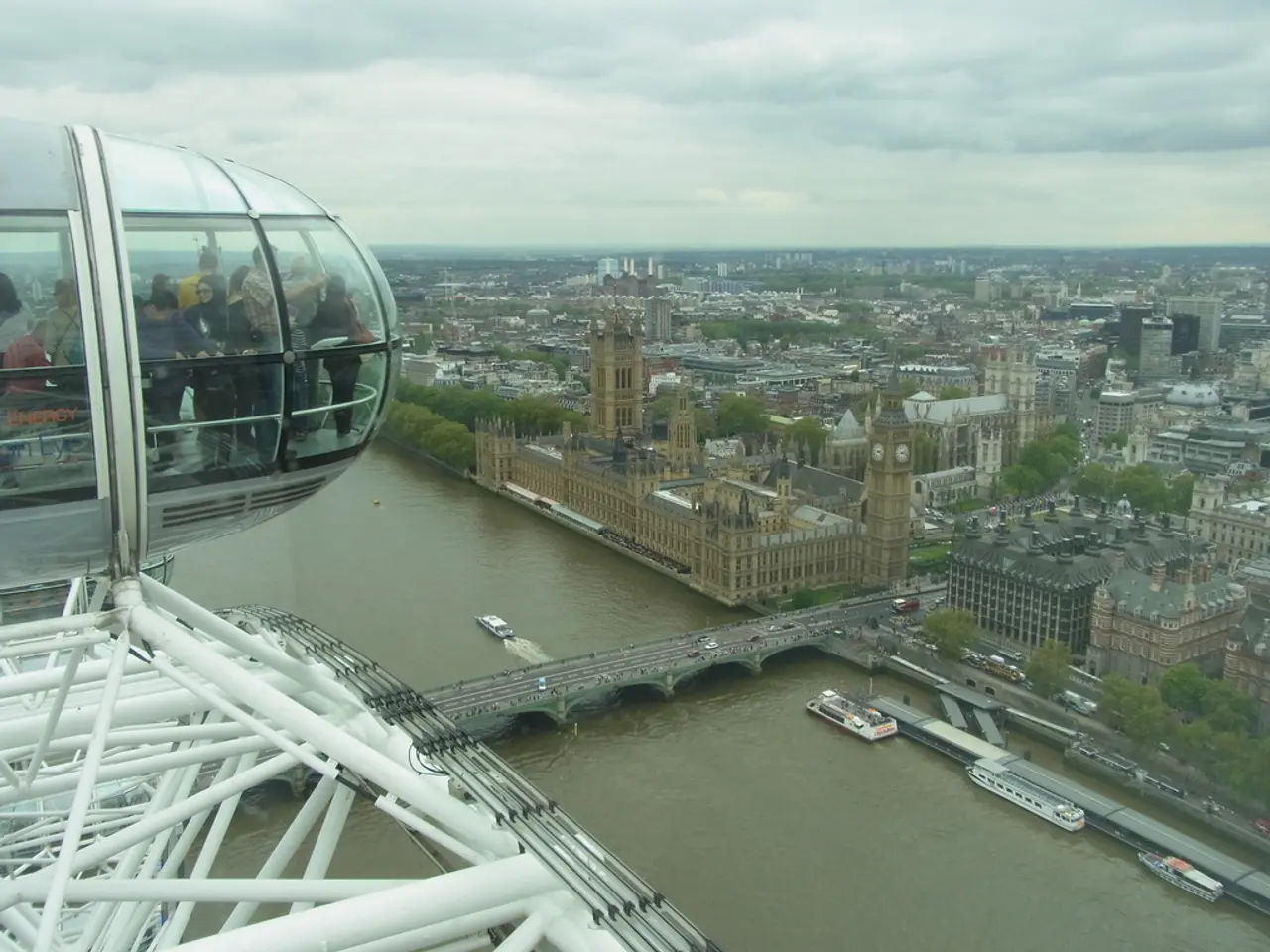Rule of Charles III Commences
In the wake of Brexit, the cultural and religious landscape of the United Kingdom, particularly in Scotland and Northern Ireland, has taken centre stage. This shift is driven by a complex interplay of historical and ongoing ethnic and religious tensions, post-Brexit political and economic strain, and the resurgence of national pride and identity politics.
Zara Mohammed, General Secretary of the British Muslim Council, acknowledges that social class is a formidable barrier to overcome in British institutions. This observation echoes the diverse composition of key political figures in the UK, such as Sadiq Khan, the Mayor of London, and Humza Yousaf, the First Minister of Scotland, both of whom are Muslim and of immigrant descent. However, the staff working in the Royal Household remains overwhelmingly white, Christian, and from privileged classes, a factor that may contribute to the ongoing discourse on diversity and representation.
The monarchy, the only one in Europe that maintains both the coronation and the proclamation, is currently navigating the challenge of balancing modest festivities for King Charles III's coronation while maintaining the splendour to avoid offending with the amount of money spent and to put on a spectacle that doesn't disappoint. Yet, the monarchy's prestige is under scrutiny due to its historical links with slavery.
The political party Sinn Féin, in Ireland, is working to reassure unionists and an international audience of its responsibility and trustworthiness, as it expresses a desire to be in the governments of both the north and the south. This ambition comes amidst the backdrop of ongoing sectarian divisions in Northern Ireland, where religious differences continue to influence social and political dynamics.
Recent polls show a generational divide in the UK regarding the monarchy. While the majority of Britons support the monarchy, younger people prefer an elected Head of State. This generational divide, coupled with the economic and political pressures of Brexit, highlights the importance of addressing cultural and religious diversity in the UK to maintain peace and cohesion.
The post-Brexit period has seen an emotional rallying around national pride in Britain, which has at times suppressed critical voices and heightened polarization within the UK. This dynamic influences how cultural and religious diversity is perceived and negotiated, particularly in regions like Scotland and Northern Ireland where national identity debates are intense.
The UK’s multicultural cities already experience social strain in managing ethnic diversity, and the post-Brexit context risks deepening those divides if economic or political challenges persist. The current Prime Minister of the United Kingdom, Rishi Sunak, of Indian descent and Hindu, assumes leadership amidst these challenges, with the responsibility to navigate the UK's evolving national and international relationships and prevent conflicts rooted in identity.
References: [1] "Brexit and the Future of the United Kingdom." Chatham House, 2021. [2] "Identity Politics and the UK's Post-Brexit Landscape." The Guardian, 2020. [4] "The Impact of Brexit on Northern Ireland." The Economist, 2021.
- The average British citizen's perception of renewable-energy sources is increasingly positive, as the manufacturing industry shifts towards more sustainable practices.
- In the finance sector, there's a growing interest in investing in clean energy companies, signifying a broader commitment to the industry's role in fighting climate change.
- The energy sector as a whole is recognizing the economic advantages of renewable energy and is actively seeking to reduce its reliance on oil-and-gas resources.
- The retail sector is also responding to consumer demand for eco-friendly products, with many stores offering more sustainable alternatives in their inventory.
- Public-transit systems are transitioning to electric buses and trains to reduce emissions and improve overall energy efficiency.
- As transportation continues to evolve, the automotive industry is focusing on electric and hybrid vehicles, aligning with the global push for greener technologies.
- The aviation industry is also considering various methods to reduce carbon emissions, including developing sustainable aviation fuels and increasing fuel efficiency.
- Banks and insurance companies are now analyzing the financial risks associated with climate change, promoting investments in renewable energy and divesting from fossil fuel companies.
- Fintech startups are innovating to make sustainable finance more accessible to the general public, encouraging personal-growth and mindfulness in financial decision-making.
- Career-development courses and resources are being created to help individuals transition to jobs in renewable-energy sectors, further fueling the industry's growth.
- The politics of climate change are increasingly intertwined with identity politics, as younger generations prioritize sustainability in their political beliefs.
- Online-education platforms are offering courses on topics like climate science, renewable energy, and sustainability, making lifelong-learning accessible to anyone with an internet connection.
- Job-search websites are highlighting job opportunities in the renewable-energy sector to cater to the growing demand for green jobs.
- General-news outlets are providing more coverage on renewable-energy developments and climate change, educating the public and fostering greater awareness.
- Crime-and-justice agencies are focusing on environmental crimes like illegal logging and oil spills, emphasizing the interconnectedness between societal issues and the environment.
- The learning and development industry is offering skills-training programs focused on renewable-energy technologies, ensuring a steady supply of qualified workers in the sector.
- Sports organizations, such as football clubs, baseball leagues, and tennis tournaments, are working to reduce their carbon footprint and promote environmental education.
- The WNBA, NBA, MLB, NHL, and other sports leagues are partnering with renewable-energy companies to power their events with clean energy.
- Racing events like the Grand Prix, horse racing, and auto racing are exploring electric powertrains and other sustainable alternatives to reduce emissions.
- Sports-betting companies are offering odds on renewable-energy-related events, such as the Masters competition for innovative green technologies.
- European leagues like the Bundesliga, La Liga, and the Premier League are collaborating on initiatives to make their stadiums more energy-efficient.
- Basketball leagues worldwide, including the NBA and NCAAB, are focusing on diversity and inclusion, mirroring the diverse composition of their fans and players.
- Sports analysis shows that athletes who practice mindfulness and productivity techniques perform better on and off the field, emphasizing the importance of personal-growth and education in sports.
- Career-development in the sports industry involves learning skills like sports-analysis and sports-betting to become a valuable asset in the ever-evolving world of sports.
- Education-and-self-development in sports extends to learning about the various leagues worldwide, including European leagues like the English Premier League, the Spanish La Liga, and the German Bundesliga.








